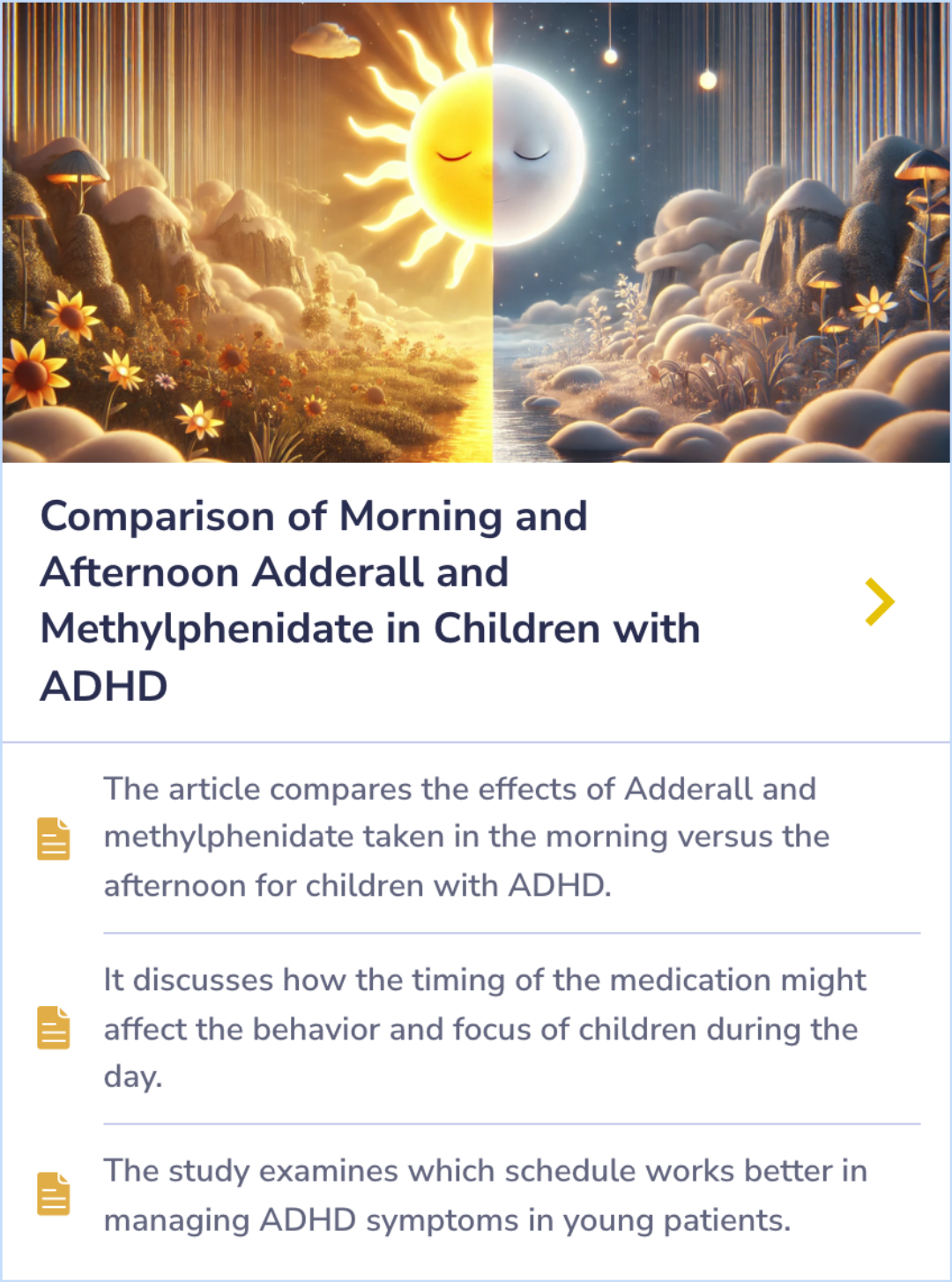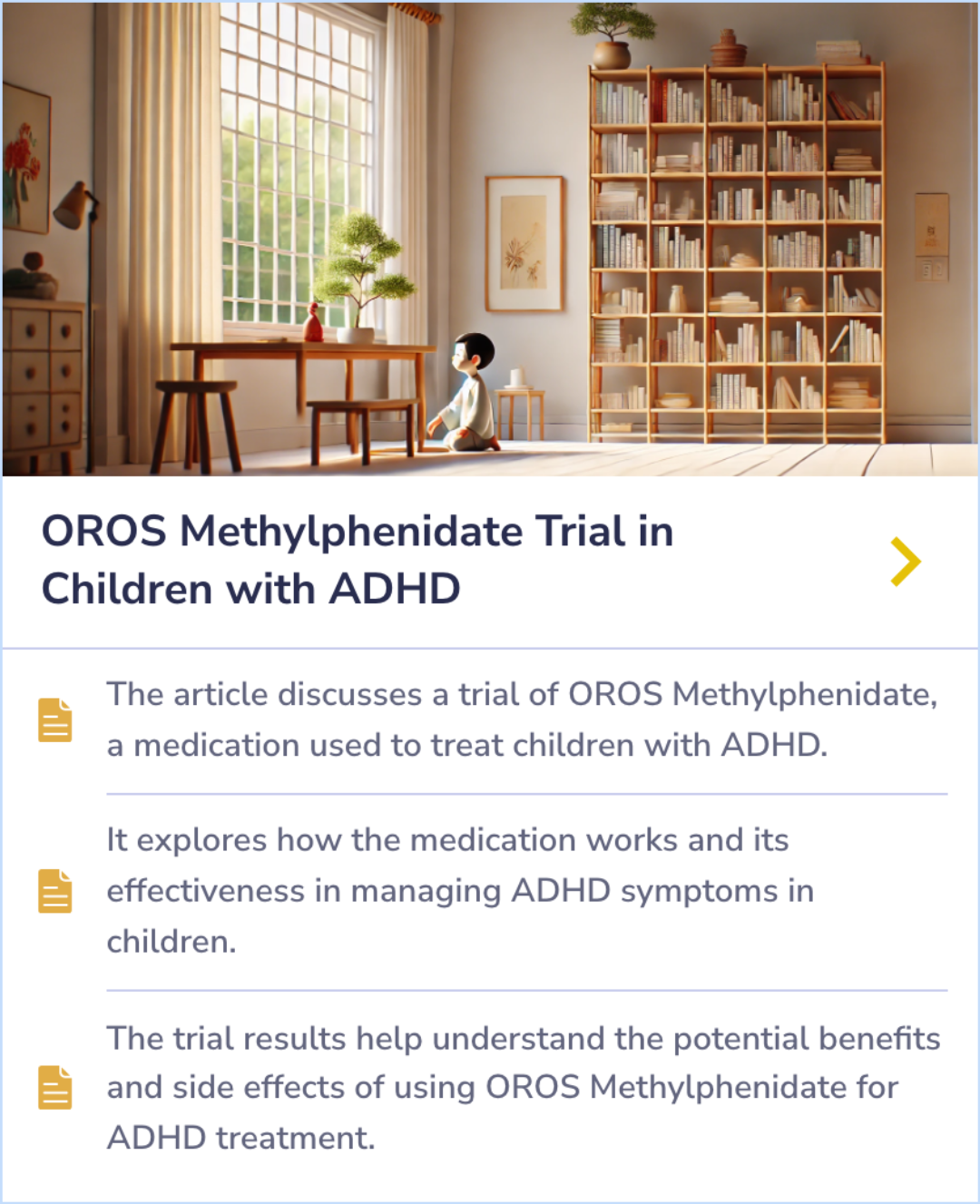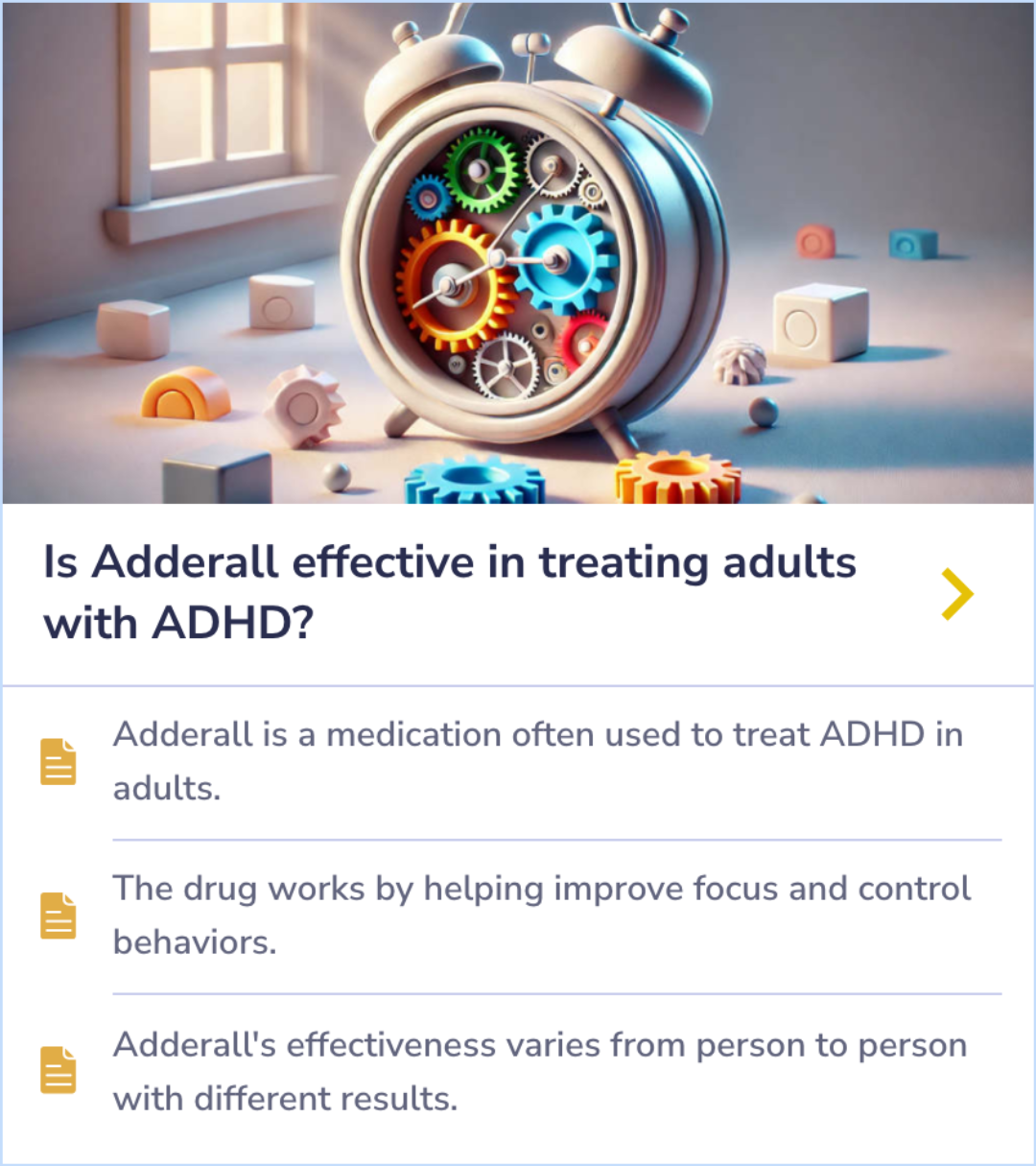Adderall
Evidence Based Answers
Does Once-Daily Adderall Improve ADHD Management?
Taking Ritalin without ADHD may offer temporary focus boosts but carries misuse risks. Such use can lead to dependency and adverse side effects over time.
Published: October 24, 2024
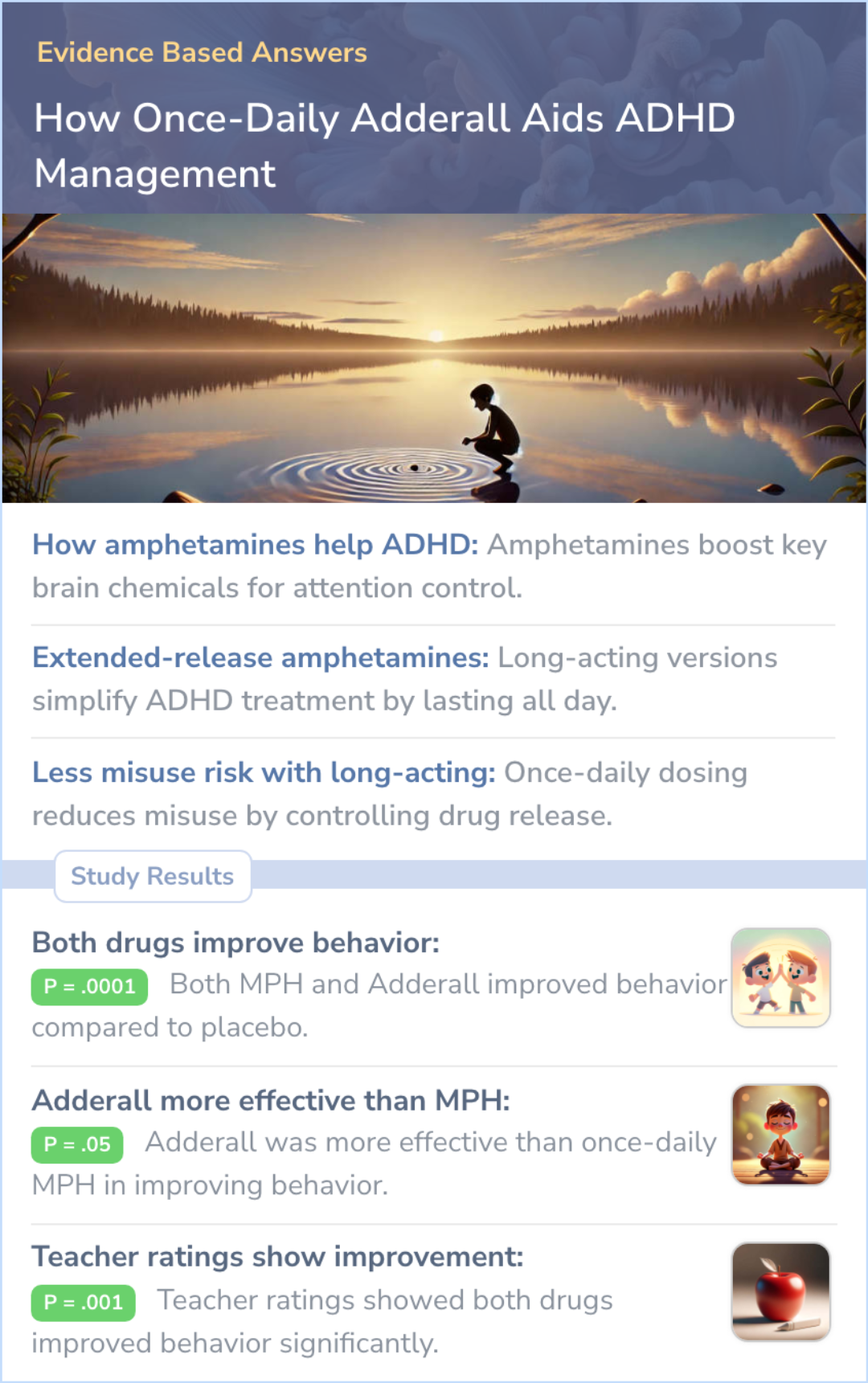
Studies Summary
🕒
Adderall XR Provides All-Day ADHD Symptom Control
A study showed that Adderall XR improves behavior throughout the entire day with a single morning dose, covering morning to late afternoon.
🎒
Long-Lasting Effect Reduces Dosing Frequency
SLI381 (Adderall XR) was found to improve classroom behavior and math performance for up to 12 hours, reducing the need for multiple doses.
🔄
Once-Daily Adderall as an Effective Alternative
Once-daily Adderall provided similar behavioral effects to twice-daily methylphenidate, offering a simpler option for managing ADHD symptoms.
Highly Cited Studies
Long term Effects of Methylphenidate in Adults
Peer Reviewed Study 1
Adderall XR's Effectiveness in All-Day ADHD Management
Peer Reviewed Study 2
Once-Daily Amphetamines Extend ADHD Management Throughout the Day
Peer Reviewed Study 3
Comparing Once-Daily Adderall and Twice-Daily Methylphenidate in ADHD Management
Background: How Amphetamines Help Manage ADHD Symptoms
Amphetamines are central nervous system (CNS) stimulants that increase key neurotransmitters like dopamine and norepinephrine in the brain. These chemicals help regulate attention and impulse control, areas often disrupted in individuals with ADHD.
Amphetamines work by entering the brain and making these neurotransmitters more available, providing a stable and sustained effect for better management of ADHD symptoms.
Amphetamines work by entering the brain and making these neurotransmitters more available, providing a stable and sustained effect for better management of ADHD symptoms.
“
Source Quotes:
Amphetamines are non-catecholamine sympathomimetic amines with CNS stimulant activity. The mode of therapeutic action in Attention Deficit Hyperactivity Disorder (ADHD) is not known. Amphetamines are thought to block the reuptake of norepinephrine and dopamine into the presynaptic neuron and increase the release of these monoamines into the extraneuronal space.
Amphetamine is a central nervous (CNS) system stimulant that functions by increasing the amounts of dopamine, norepinephrine, and serotonin (to a lesser extent) in the synaptic cleft through a variety of mechanisms.
Background: Advantages of Extended-Release Amphetamines
Extended-release amphetamine formulations are designed for once-daily dosing, simplifying ADHD management for both patients and caregivers. These formulations release medication steadily throughout the day, reducing the need for multiple doses.
This consistency in symptom control leads to better overall management of ADHD from morning to evening.
This consistency in symptom control leads to better overall management of ADHD from morning to evening.
“
Source Quotes:
Extended-release formulations are intended for once-daily dosing, but they may require concomitant use of an immediate-release medication as the clinical effect wears off in the afternoon.
Amphetamine medications for ADHD are available in immediate- and extended-release formulations and have an onset of action of 20 to 60 minutes. The immediate-release formulation of dextroamphetamine-amphetamine has a duration of up to 6 hours. Longer-acting formulations may last up to 10 to 12 hours.
Background: Reducing Misuse with Long-Acting Amphetamines
Long-acting amphetamine formulations improve medication adherence by requiring only once-daily dosing. This simplifies treatment regimens and makes it easier for patients to stay consistent with their medication.
The extended release reduces the potential for misuse, as the slow release minimizes the 'high' that can lead to abuse.
The extended release reduces the potential for misuse, as the slow release minimizes the 'high' that can lead to abuse.
“
Source Quotes:
Studies suggest that longer-acting stimulants may be less likely to be abused or diverted.
A lower abuse potential for long-acting compared with short-acting stimulants is based on studies demonstrating greater subjective responses and potential reinforcement for immediate-release stimulants compared with extended-release methylphenidate in healthy adults.
Background: Amphetamines vs. Methylphenidate: A Comparison
Both amphetamines and methylphenidate are effective in managing ADHD symptoms, but some studies suggest amphetamines may offer a slight advantage. For example, amphetamines may be more effective at reducing core symptoms of ADHD like inattention, impulsivity, and hyperactivity.
Understanding these differences helps in choosing the most effective medication for individual needs.
Understanding these differences helps in choosing the most effective medication for individual needs.
“
Source Quotes:
While amphetamines and methylphenidate have long been considered comparably efficacious for adult ADHD, some data appear to show a benefit of amphetamines in reducing core symptoms of ADHD (eg, inattention, impulsivity, hyperactivity) compared with methylphenidate.
Amphetamines were slightly more efficacious than methylphenidate in reducing clinician-rated core symptoms of ADHD at approximately 12 weeks (standardized mean difference -0.24, 95% CI -0.44 to -0.05).
Peer Reviewed Study
Study: Adderall XR's Effectiveness in All-Day ADHD Management
The study evaluated SLI381 (Adderall XR), a once-daily extended-release formulation, in children with ADHD. It was found to improve behavior throughout the day with just one morning dose, showing significant improvements in morning, afternoon, and late afternoon behavior.
The consistent dose-related improvements across all measures suggest that Adderall XR can effectively manage ADHD symptoms over the entire day with a single dose.
The consistent dose-related improvements across all measures suggest that Adderall XR can effectively manage ADHD symptoms over the entire day with a single dose.
author
Biederman J, Lopez FA, Boellner SW, Chandler MC
journal
Pediatrics
Date Published
2002 Aug
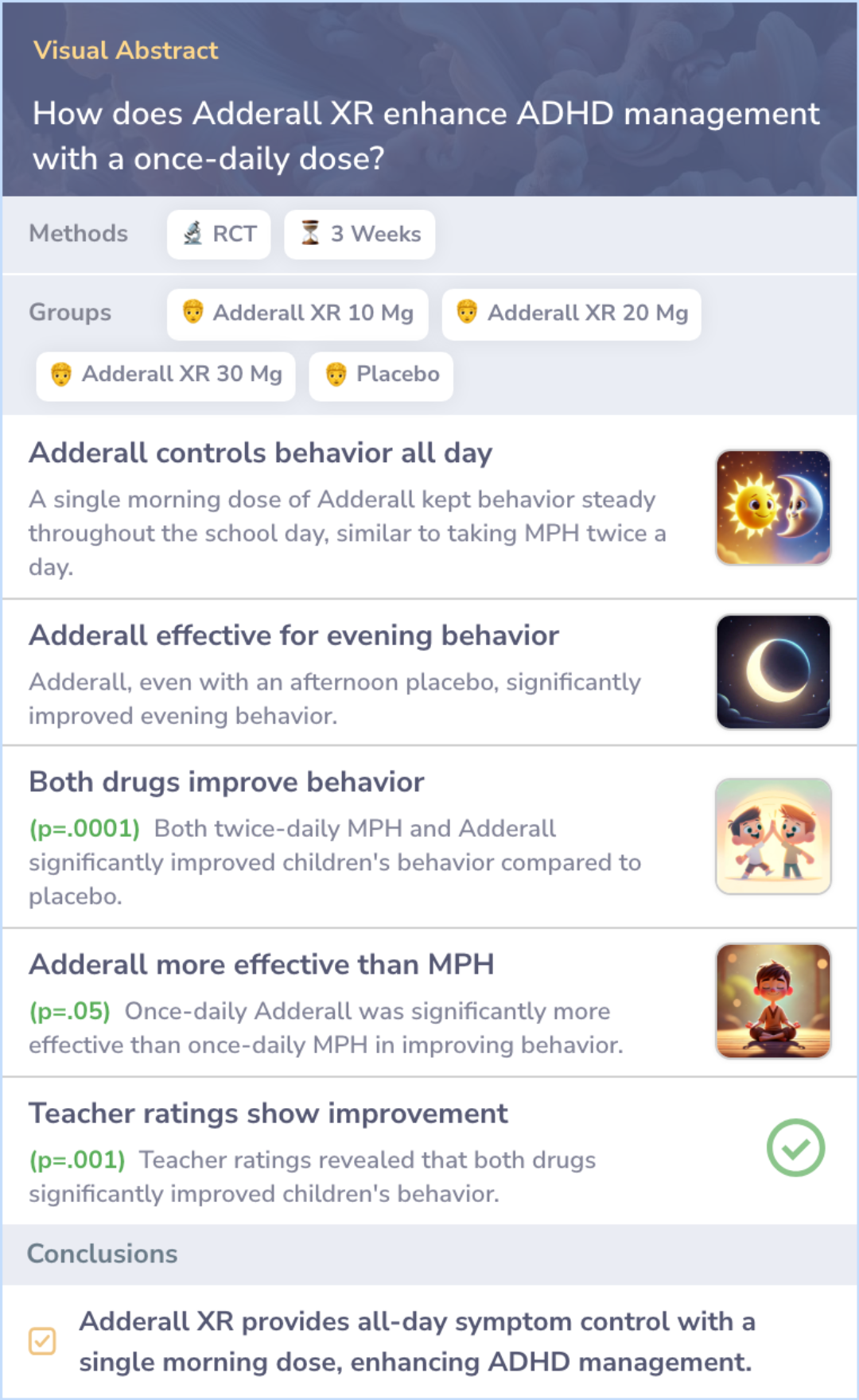
Peer Reviewed Study
Study: Once-Daily Amphetamines Extend ADHD Management Throughout the Day
The study focused on SLI381 (Adderall XR), a once-daily treatment for children with ADHD, comparing different doses with placebo and Adderall. Results showed that SLI381, particularly at 20 and 30 mg doses, improved classroom behavior and math performance for up to 12 hours. This longer duration of action means fewer doses are needed throughout the day, reducing the chance of dose diversion and removing the need for in-school dosing.
This could simplify ADHD treatment by offering a consistent, long-lasting effect.
This could simplify ADHD treatment by offering a consistent, long-lasting effect.
author
McCracken JT, Biederman J, Greenhill LL, Swanson JM, McGough JJ, Spencer TJ, Posner K, Wigal S, Pataki C, Zhang Y, Tulloch S
journal
J Am Acad Child Adolesc Psychiatry
Date Published
2003 Jun
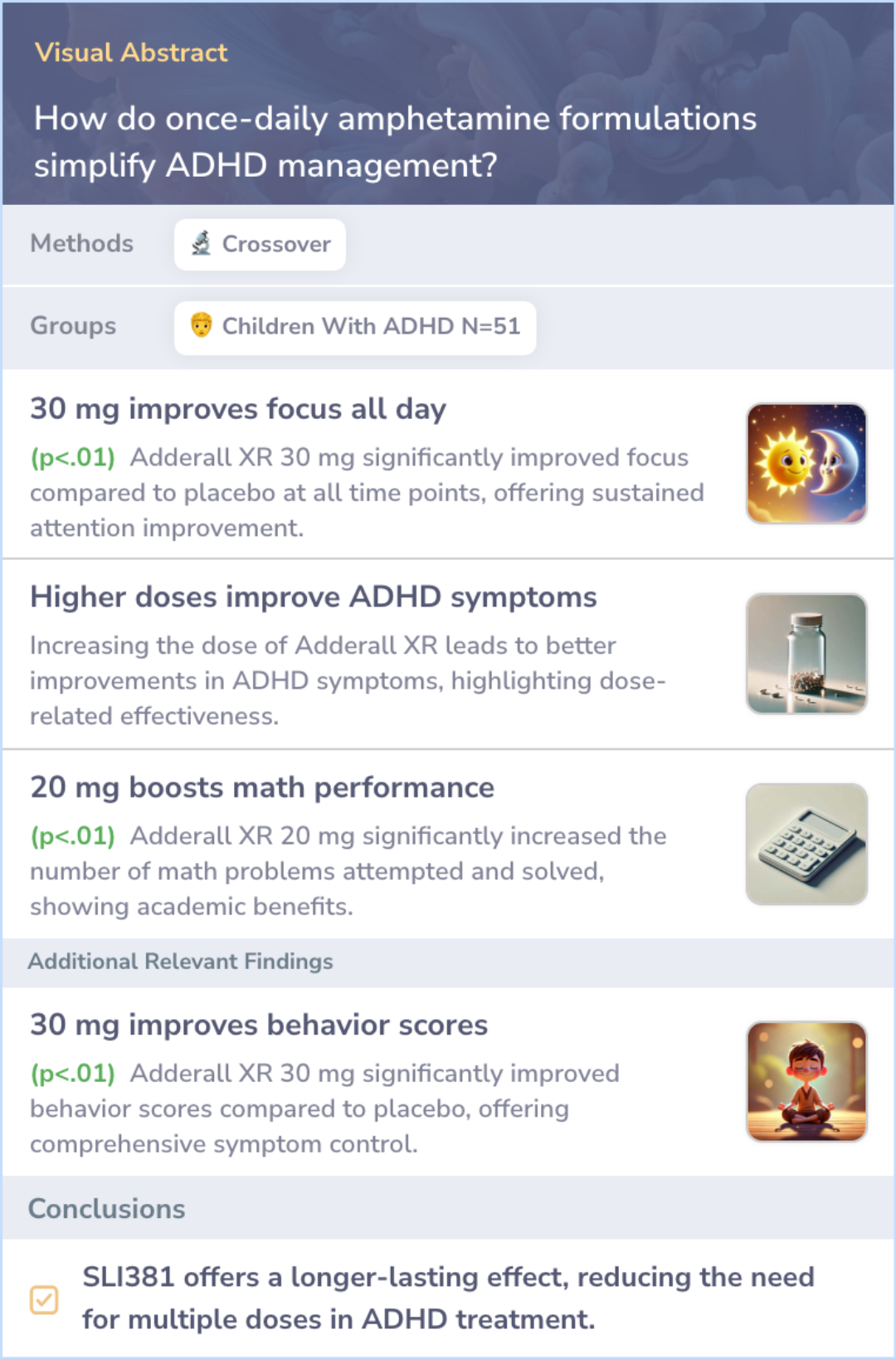
Peer Reviewed Study
Study: Comparing Once-Daily Adderall and Twice-Daily Methylphenidate in ADHD Management
This study compared once-daily Adderall with twice-daily methylphenidate (MPH) in children with ADHD during a typical school day. A single morning dose of Adderall produced similar behavioral effects to twice-daily MPH, lasting throughout the school day.
Results showed that once-daily Adderall could effectively manage ADHD symptoms during the school day, offering an alternative to twice-daily dosing with MPH, which may wear off in the afternoon.
Results showed that once-daily Adderall could effectively manage ADHD symptoms during the school day, offering an alternative to twice-daily dosing with MPH, which may wear off in the afternoon.
author
Pelham WE, Gnagy EM, Chronis AM, Burrows-MacLean L, Fabiano GA, Onyango AN, Meichenbaum DL, Williams A, Aronoff HR, Steiner RL
journal
Pediatrics
Date Published
1999 Dec
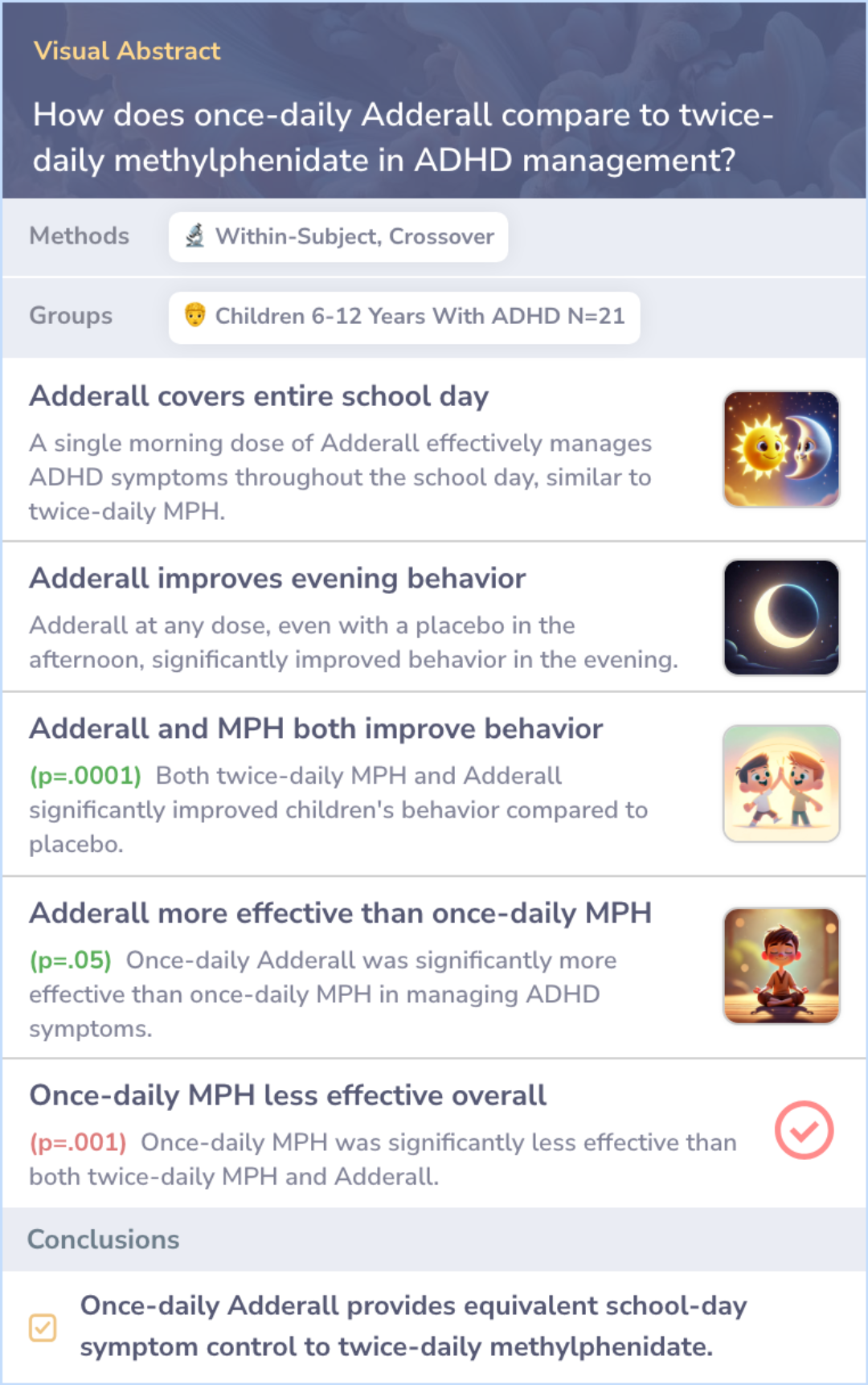
Key Takeaways
Conclusions
Once-daily Adderall formulations offer a powerful solution in ADHD management by effectively utilizing amphetamines to manage symptoms. The extended-release design simplifies treatment, reducing the frequency of doses, which aids in maintaining consistent symptom control and lessens misuse risks.
Studies show that these formulations enhance classroom performance and behavior throughout the day, offering an alternative to twice-daily methylphenidate. By leveraging steady, long-lasting effects, once-daily Adderall addresses ADHD with fewer doses, ensuring patient adherence and improved daily functioning.
Studies show that these formulations enhance classroom performance and behavior throughout the day, offering an alternative to twice-daily methylphenidate. By leveraging steady, long-lasting effects, once-daily Adderall addresses ADHD with fewer doses, ensuring patient adherence and improved daily functioning.

Evidence Summary
Timing of ADHD Medication: Morning vs. Afternoon
Exploring how ADHD medications influence daily functioning by comparing morning versus afternoon doses. Morning doses of Adderall and methylphenidate might enhance focus and behavior more effectively than afternoon doses, tailoring symptom management for young patients. This insight aligns with research on the timing's impact on managing ADHD efficiently.
Evidence Summary
Exploring OROS Methylphenidate's Role in ADHD Treatment
This trial focuses on OROS Methylphenidate's impact on children with ADHD, highlighting its role in managing symptoms. It evaluates the medication's effectiveness by detailing trial findings on symptom control and potential side effects. The study provides specific insights into how OROS Methylphenidate can be utilized in ADHD treatment, offering a snapshot of its therapeutic value and considerations.
Evidence Summary
Individual Responses to Adderall in ADHD Treatment
Adderall, commonly prescribed for adults with ADHD, aids in improving focus and behavior management. It enhances concentration and helps manage symptoms, though its effects differ among users. Some might find it extremely effective, while others may experience varied results.
The medication operates uniquely for each individual, indicating the importance of tailored approaches in ADHD treatment for optimal outcomes.
The medication operates uniquely for each individual, indicating the importance of tailored approaches in ADHD treatment for optimal outcomes.
